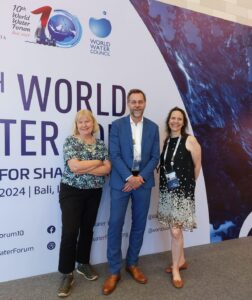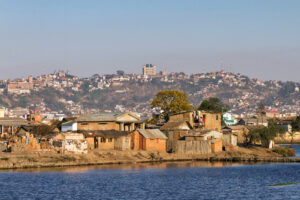What does the future of water cooperation look like? 3 questions to Virginia Mariezcurrena
“Access to water is not only a survival need but a human right. Unfortunately, in some contexts, this right has been hijacked and water is used as a means of extortion or punishment, the so-called weaponization of water.”
How do the projects that you are a part of for the WASH department contribute to, or support, peaceful water cooperation?
In several ways. It is important to note that even with the best intentions, projects to deliver WASH services can do more harm than good if they are not taking into account local power dynamics or pre-existing conflicts.
To contribute to this, some years ago we mapped the accountability lines and relationships across different actors in fragile contexts, and we published a concept note showing that increased accountability is a powerful tool to bring back trust and improve sustainable service delivery and reestablish peace in the long run. It concludes by recommending working along five principles to increase accountability for improved WASH in conflict-prone areas: understanding the existing accountability framework and the political nature of service delivery in fragile contexts, working towards rebuilding trust among the key national stakeholders (citizens, service providers, regulators and policy makers) while improving the quality of services, proactively moving towards the re-establishment of the national service delivery framework, invest more in preparedness, conflict prevention and building sector resilience, with a more long-term, risk-informed approach and prioritize continued capacity development and systems strengthening.
Some months back, we adjusted a well-known methodology (WASH BAT) adding the conflict dimension in the criteria for facilitating the participant make a diagnosis of the WASH Sector and adjusting several parts of the methodology to integrate climate change for resilient WASH services. The methodology was tested in Papua New Guinea with interesting results and insights.
“Interventions need to be carefully designed that genuinely include the local communities who will be served, see through the gender disparities, and try to contribute to the transformation of the social norms where inequities lie.”
What does the future of water cooperation look like to you?
I think that cooperation around WASH services and water resources needs to be strengthened, and for that, there would be the need to create and streamline methodologies, good practices, and guidelines, which is what SIWI can contribute to.
Interventions need to be carefully designed that genuinely include the local communities who will be served, see through the gender disparities, and try to contribute to the transformation of the social norms where inequities lie, that hold clear accountability lines with the institutions responsible for service provision and that ensures a feedback mechanism where concerns and complaints can be heard and acted upon. Research has shown that trust, clear accountability, working in preparedness, plus inclusion, opportunity to participate and state legitimacy are essential contributors to peace when working on WASH programs in conflict prone areas.
Interventions need to be carefully designed that genuinely include the local communities who will be served, see through the gender disparities, and try to contribute to the transformation of the social norms where inequities lie, that hold clear accountability lines with the institutions responsible for service provision and that ensures a feedback mechanism where concerns and complaints can be heard and acted upon. Research has shown that trust, clear accountability, working in preparedness, plus inclusion, opportunity to participate and state legitimacy are essential contributors to peace when working on WASH programs in conflict prone areas.
Human Rights Based Approach
Poor and marginalized groups are disproportionately affected by almost all water-related problems. SIWI applies a human rights-based approach to ensure that people living in vulnerable circumstances can influence decisions of importance to them.
Learn more about HRBA at SIWI











